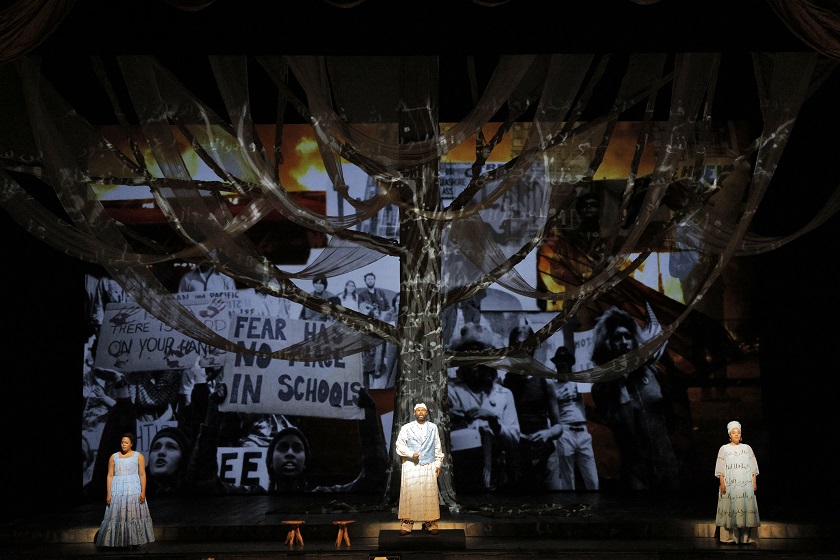
FOLKSINGER’S MIDAS TOUCH WITH OPERA
The latest sensation in opera is the unorthodox “Omar,” written by the polymath folksinger Rhiannon Giddens, winner of a Pulitzer, MacArthur “genius” award and Grammy. With co-composer Michael Abels, she turned out the multicultural drama now staged at the San Francisco Opera. It is based on the true story of Omar ibn Sayyid, a 19th-century African-Arab Islamic savant and author who had been forced into slavery and shipped off to the cotton fields.
The work is unique in opera annals, combining multiple cultures, languages and faiths. After a dark first act of capture and captivity, the work comes brilliantly to life in the second when Omar’s talents emerge as author and imam of divine inspiration. The music too produces many threads, variously Afro-Arabian, New-World slave dance, jazz/blues and early Americana bordering on spiritual—what you can achieve with an unorthodox two-composer lineup, a new feature for the well-deserved operatic Pulitzer Prize. Above all, “Omar” dramatizes one of the little-known heroic tales of emerging America, known mostly for his voluminous writings (religious and otherwise) in the archives.
In the end, “Omar” emphasizes the variety of cultures that made America great while dramatizing the times of slavery, both evil and cruel. The cast is almost entirely black, echoing “Porgy and Bess.”
For much of the show, the spark was slow in ignition, with voices more theatrical than truly operatic. But these too opened up to lustrous life in the triumphant finale that so many of us found moving, with Omar leading the hard-working chorus through, yes, prayer meetings. It struck me as contrived to have all the blacks positive, and the white (slave-owners) negative with just one exception. Even “Porgy” moved away from such one-D characters.
Repeating his casting of recent years, baritone James McCorkle saved his best for last, when his rich sounds carried throughout the hall in a worship scene, where many singers filled the Opera House aisles in an operatic embrace to underline a very public message cutting across lines political, religious and cultural. (One of the primary themes is the proximity of Islamic and Christian faiths, which Omar espouses and symbolizes in his embracing the 23rd Psalm.) The biggest ovation of the night—which probably should have gone to the chorus in their immense role—went to his lost-and-regained beloved Julie. Interpreter and soprano Brittany Renee was radiant, projecting to the farthest corners. In a recurrent posthumous part, Omar’s mother Fatima was played tautly by mezzo Taylor Raven.
Stage Director Kaneza Schaal held together this quasi-historical account sprawled over 10 scenes. Unforgettable was the stage design by Christopher Myers and Amy Rubin, with immense trees draped in white cloths, and countless bolts of rich stage-embracing fabric from above. Conducting the challenging score was John Kennedy.
This is a multifaceted opera whose time is now, destined to continue playing on many stages in the US and abroad.
MUSIC NOTES–Giddens, 47, is a 1995 alumna of the North Carolina School of Science and Mathematics. She went on to graduate from the Oberlin Conservatory at Oberlin College. Like the later Omar, she is North Carolinian… This season, more adventurous than ever, the SFO has co-commissioned an unprecedented array of new works by Mason Bates, the Giddens-Abels duo, and the late Kaija Saariaho. In addition, 2023 brought on the Mexican-American saga of Frida Kahlo, Gabriela Frank’s bio-op ”The Last Dream of Frida and Diego.” Three of the four involve women composers…. The Sunday matinee opener of “Omar” enjoyed a full house, with plaudits running close to double the four minutes penciled in by management…. No protesters were seen inside or out, despite the current Middle-East warfare.
The Giddens-Abels “Omar” (2022), in English with some Arabic, by the San Francisco Opera Nov. 5-21. Two acts, one intermission, two hours 45 min. Opera House, S.F. For info: (415) 864-3330, or go online www.sfopera.com.